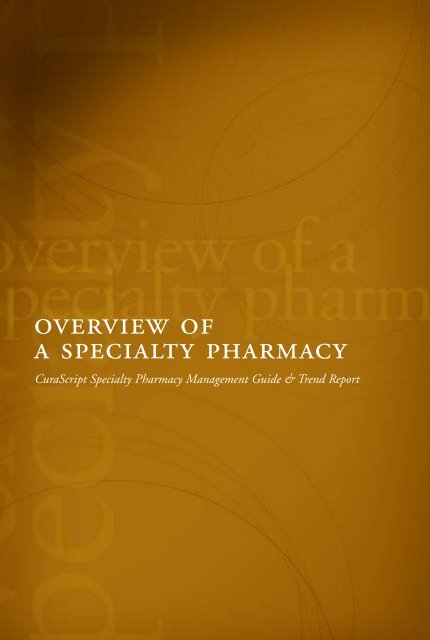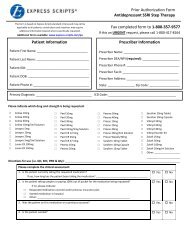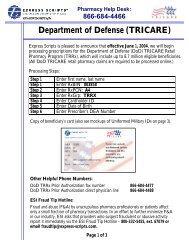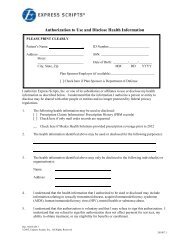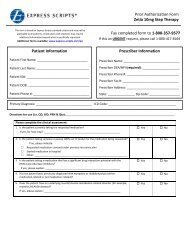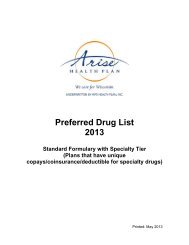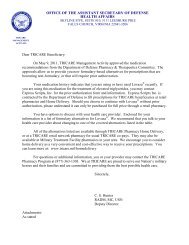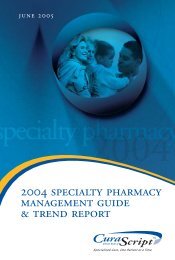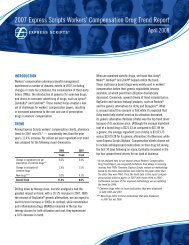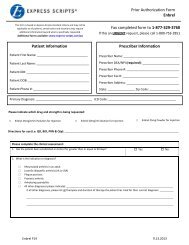overview of a specialty pharmacy - Express Scripts
overview of a specialty pharmacy - Express Scripts
overview of a specialty pharmacy - Express Scripts
- No tags were found...
Create successful ePaper yourself
Turn your PDF publications into a flip-book with our unique Google optimized e-Paper software.
<strong>overview</strong> <strong>of</strong>a <strong>specialty</strong> <strong>pharmacy</strong>CuraScript Specialty Pharmacy Management Guide & Trend Report
Overview <strong>of</strong> a Specialty PharmacySpecialty pharmacies use several strategies to address the challengingcharacteristics <strong>of</strong> <strong>specialty</strong> drugs. These strategies include:• Availability <strong>of</strong> <strong>specialty</strong> medications and supplies for administration• Experienced and knowledgeable clinical-support teams• Patient-care coordination and compliance monitoring• Coordination <strong>of</strong> home-care services• Clinical <strong>pharmacy</strong> management <strong>of</strong> disease-specific programs• Pharmacy and medical benefit billing and reimbursement• Combined <strong>pharmacy</strong> and medical benefit <strong>specialty</strong>-drugutilization management• Formulary management support servicesMost <strong>specialty</strong> drugs are used to treat chronic diseases that affect lessthan 3% <strong>of</strong> the general population. Thus, the volume <strong>of</strong> <strong>specialty</strong>-druguse is relatively low when compared with the use <strong>of</strong> traditional drugs.Additionally, many <strong>of</strong> the <strong>specialty</strong> drugs currently available are not availablethrough open distribution channels. Due to lowered treatment prevalenceor limited supply <strong>of</strong> the drugs, pharmaceutical manufacturers may controlaccess to their <strong>specialty</strong> products by using specified distributors. Thesedistribution factors, combined with the typically high acquisition andinventory carrying costs associated with <strong>specialty</strong> drugs, make <strong>specialty</strong>drugdistribution impractical for traditional distribution channelssuch as retail pharmacies.<strong>overview</strong> <strong>of</strong> a <strong>specialty</strong> <strong>pharmacy</strong>Specialty pharmacies focus on the supply and distribution <strong>of</strong> <strong>specialty</strong>drugs; therefore, they have immediate inventory <strong>of</strong> <strong>specialty</strong> drugs andthe supplies needed for proper administration. Specialty-drug distributorswork with manufacturers and wholesale distribution channels to ensurecontinuous supplies and to leverage volume, resulting in discounts thatcan be passed to clients.19
<strong>overview</strong> <strong>of</strong> a <strong>specialty</strong> <strong>pharmacy</strong>PATIENT-CARE COORDINATIONPatient-care coordination is the process that oversees multiple aspects <strong>of</strong> therapyfor patients receiving <strong>specialty</strong> drugs. Because <strong>specialty</strong>-drug treatment maychange frequently, patient-care management includes monitoring for:• Adequate home or <strong>of</strong>fice inventory levels <strong>of</strong> the drugs• Adherence to prescribed drug regimens• Continuity <strong>of</strong> care• Coordination <strong>of</strong> home-care services• Patient assessment screening surveys• Ongoing prior authorization requirements• Eligibility or benefits changesPatient-care coordinators work in conjunction with licensed cliniciansto provide comprehensive clinical-management services. By providingpatient-assessment screening surveys at each refill, patient-care coordinatorsassist the clinical team in identifying high-risk patients and adverse clinicalevents at routine intervals. Exhibit 11 provides an example <strong>of</strong> a CuraScriptpatient-care management process flow.Exhibit 11CuraScript Patient-Care Management Process Flow20 CuraScript <strong>specialty</strong> <strong>pharmacy</strong> management guide & trend report 2004
Specialty drugs have unique handling and administration needs thatrequire knowledgeable management. Therefore, <strong>specialty</strong> pharmaciesrecruit healthcare pr<strong>of</strong>essionals who have experience with the treatment<strong>of</strong> patients using <strong>specialty</strong> drugs. Similar to physicians who require specificeducational backgrounds to specialize in the treatment <strong>of</strong> diseases suchas hepatitis and multiple sclerosis (MS), healthcare pr<strong>of</strong>essionals whomanage <strong>specialty</strong> drugs also require specialized, ongoing training tomaintain high levels <strong>of</strong> expertise. Standard training for pharmacistsdoes not specifically address the handling requirements <strong>of</strong> <strong>specialty</strong>drugs. Additionally, the majority <strong>of</strong> pharmacists do not encounterthese drugs in general practice. Specialty pharmacists, however, undergoextensive education in all aspects <strong>of</strong> <strong>specialty</strong>-drug management.CLINICAL MANAGEMENTIn addition to pharmacist specialization and training, <strong>specialty</strong>-drugmanagement frequently extends beyond the <strong>pharmacy</strong> and the physician’s<strong>of</strong>fice, since patients will <strong>of</strong>ten require home-healthcare services to supportin-home injection training or ongoing infusion services. Therefore,<strong>specialty</strong> pharmacies need to be able to provide coordination <strong>of</strong> nursingservices in the home setting. Many times the need for nursing care maybe a one-time, education and training home visit — not a long-termneed. Separating drug delivery from nursing care <strong>of</strong>ten decreases costsby limiting higher-than-necessary levels <strong>of</strong> care.<strong>overview</strong> <strong>of</strong> a <strong>specialty</strong> <strong>pharmacy</strong>Clinical <strong>pharmacy</strong> oversight can <strong>of</strong>ten be provided by telephone, reducingthe need for acute in-home services. Thus, <strong>specialty</strong> pharmacies usea multidisciplinary team <strong>of</strong> experienced registered nurses and socialworkers, in addition to trained pharmacists, to support the complexmanagement requirements <strong>of</strong> chronically ill patients receiving <strong>specialty</strong>medications. This team <strong>of</strong> licensed clinicians provides clinical management,including the following interventions:• Medication self-administration oversight• Clinical assessment and patient monitoring• Disease state and medication education• Side-effect management• Physician consultation• Drug utilization evaluation and poly-<strong>pharmacy</strong> review21
<strong>overview</strong> <strong>of</strong> a <strong>specialty</strong> <strong>pharmacy</strong>• Therapeutic interchange and formulary management• Care coordination with other healthcare providers• Psychosocial support• Community resourcingThese services bring the added value <strong>of</strong> disease-management conceptsto <strong>pharmacy</strong>, with critical pathway management and targeted, proactiveclinical interventions at specific intervals throughout treatment to optimizeclinical outcomes. Ongoing, objective measurement <strong>of</strong> clinical-outcomesindicators specific to the disease and its treatment is paramount to quantifyingthe success <strong>of</strong> care-management strategies. For example, in the treatment<strong>of</strong> rheumatoid arthritis (RA) with <strong>specialty</strong> medications such as Enbrel ®or Humira ® , the key measurements <strong>of</strong> response to the treatment areimproved joint mobility and functional capacity, which can bothbe measured objectively at established intervals. By evaluating clinicalmeasurements, <strong>specialty</strong> pharmacies can document and providetreatment outcomes to clients.A high rate <strong>of</strong> adherence with <strong>specialty</strong>-drug regimens is <strong>of</strong>ten criticalto both short- and long-term outcomes. For example, therapy adherence<strong>of</strong> greater than 80% is linked directly to positive treatment outcomesfor patients with hepatitis C. 9 Specialty-<strong>pharmacy</strong> programs, suchas patient-care management and clinical oversight by experiencedhealthcare pr<strong>of</strong>essionals, increase adherence rates among <strong>specialty</strong><strong>pharmacy</strong>patients when compared with patients receiving drugsfrom other distribution channels.Exhibit 12 presents the results <strong>of</strong> one analysis that evaluated adherencerates between patients using CuraScript Specialty Pharmacy versusretail pharmacies to obtain drugs to treat hepatitis C.9McHutchinson JG, et al. Adherence to combination therapy enhances sustained response in genotype 1 infected patients withchronic hepatitis C. Gastroenterology. 2002;123:1061-1069.22 CuraScript <strong>specialty</strong> <strong>pharmacy</strong> management guide & trend report 2004
Exhibit 12Adherence to Hepatitis C TherapySpecialty Pharmacy vs Retail Pharmacy Distribution Models 10100806040200<strong>overview</strong> <strong>of</strong> a <strong>specialty</strong> <strong>pharmacy</strong>10Burton, D., Shenouda, S., Smith, C., Spears, J. Adherence to Hepatitis C Treatment Based on Refill Rates, PosterPresentation, Academy <strong>of</strong> Managed Care Pharmacy 17th Annual Meeting, April 2005, Denver.23
<strong>overview</strong> <strong>of</strong> a <strong>specialty</strong> <strong>pharmacy</strong>BILLING, REIMBURSEMENT AND DATA MANAGEMENTCoverage for <strong>specialty</strong> drugs may be provided under the medical benefit,the prescription-drug benefit or both. Due to these complex coverageissues, <strong>specialty</strong> pharmacies must be prepared to manage multiple types<strong>of</strong> billing and reimbursement, ranging from electronic adjudicationusing the National Council for Prescription Drug Programs (NCPDP)format to more traditional paper claims. The higher cost <strong>of</strong> <strong>specialty</strong>drugs leads to other billing-related issues that include coordination <strong>of</strong>benefits and prior authorization requirements. To be successful, <strong>specialty</strong>pharmacies must also support these additional reimbursement needs.Combined prescription- and medical-benefit billing requirementsin a <strong>specialty</strong>-<strong>pharmacy</strong> setting also create unique opportunities forcomprehensive <strong>specialty</strong>-utilization management. Working with clientsponsors, <strong>specialty</strong> pharmacies have designed programs that superviseappropriate utilization <strong>of</strong> <strong>specialty</strong> drugs and ensure medical necessity<strong>of</strong> ongoing treatment, regardless <strong>of</strong> benefit coverage.For example, to manage the treatment <strong>of</strong> RA, clients need to considerall <strong>of</strong> the <strong>specialty</strong> RA drugs. Although most self-injected <strong>specialty</strong> drugsfor RA (Humira ® , Enbrel ® and Kineret ® ) usually are currently coveredas a prescription-drug benefit, another <strong>specialty</strong> drug used to treat RA,Remicade ® , an infused agent, is more likely to be covered under medicalbenefits. Requiring prior authorization on the prescription-drug benefitside could increase the use <strong>of</strong> these drugs on the medical benefit sideif medical benefits are not also managed. By distributing all four productsthrough a <strong>specialty</strong> <strong>pharmacy</strong>, however, the client can evaluate all the<strong>specialty</strong>-drug treatments for appropriateness prospectively — regardless<strong>of</strong> benefit coverage — not only when they are started, but also periodicallyduring therapy.In evaluating combined <strong>pharmacy</strong> and medical benefit <strong>specialty</strong>-drugutilization management, the following results were reported at the spring2004 Academy <strong>of</strong> Managed Care Pharmacy meeting (Exhibit 13).24 CuraScript <strong>specialty</strong> <strong>pharmacy</strong> management guide & trend report 2004
<strong>overview</strong> <strong>of</strong> a <strong>specialty</strong> <strong>pharmacy</strong>Continued27
<strong>overview</strong> <strong>of</strong> a <strong>specialty</strong> <strong>pharmacy</strong>Specialty pharmacies are positioned not only to provide formularyadministrative and consultative services, but also to align the payer’scost-containment objectives with optimal therapy. Formulary managementfor <strong>specialty</strong> drugs, similar to traditional oral medications, requiresmanagement oversight to maximize penetration and performancefrom the formulary <strong>of</strong>fering.In analyzing all the services required to manage <strong>specialty</strong> drugs andthe required services provided by <strong>specialty</strong> pharmacies to meet this need,it is evident that not all distribution channels are set up operationallyto handle the unique challenges <strong>of</strong> <strong>specialty</strong> drugs’ inherent servicerequirements. Exhibit 15 compares the various distribution channelsbased on service requirements <strong>of</strong> <strong>specialty</strong> drugs.28 CuraScript <strong>specialty</strong> <strong>pharmacy</strong> management guide & trend report 2004
<strong>overview</strong> <strong>of</strong> a <strong>specialty</strong> <strong>pharmacy</strong>Notes30 CuraScript <strong>specialty</strong> <strong>pharmacy</strong> management guide & trend report 2004


